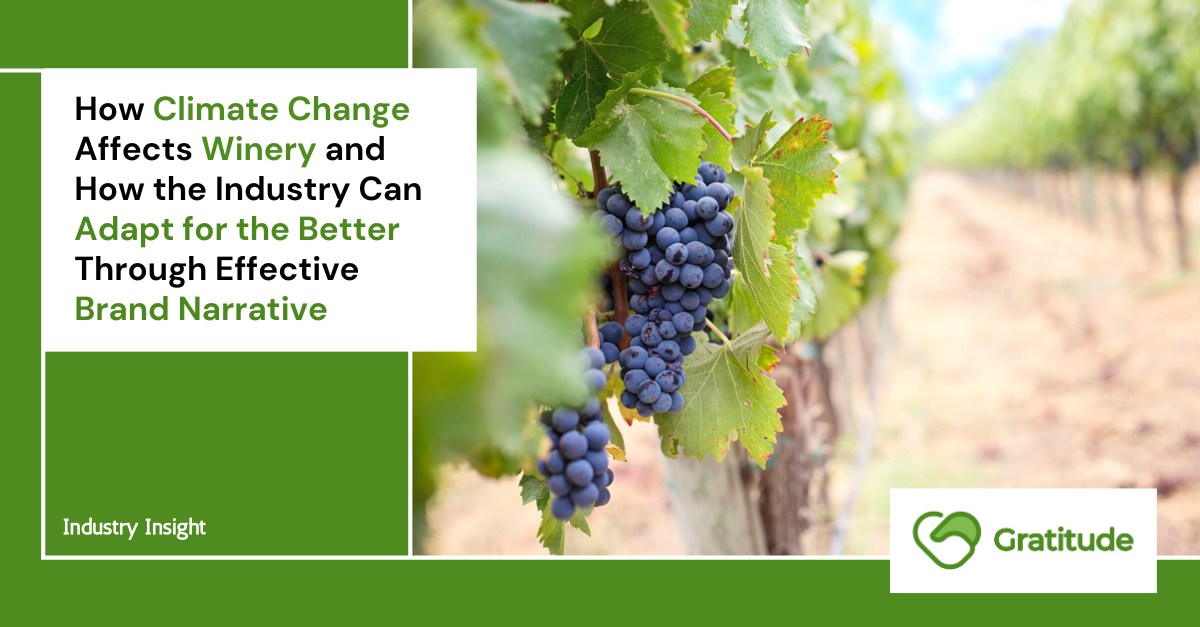As global temperatures continue to rise, no industry is immune to the effects of climate change, including the global wine industry. The winery business, intrinsically tied to the land, is particularly vulnerable to shifts in climate, as changes in temperature, precipitation, and the frequency of extreme weather events can significantly influence the quality and quantity of grape yields. Here, we explore how climate change affects the wine industry and how businesses can effectively communicate this narrative to customers to foster awareness and inspire action.
1. The Impact of Climate Change on Viticulture
Viticulture, the cultivation of grapevines, is profoundly weather-dependent. Factors such as temperature, rainfall, and sunlight significantly impact vine growth, grape maturation, and, ultimately, wine quality.
i. Changing Temperatures
According to data from the Intergovernmental Panel on Climate Change (IPCC), average global temperatures have increased by about 1°C since pre-industrial times. Though this shift might seem insignificant, it has far-reaching implications for viticulture.
In the world of wine, temperature is a crucial factor that influences grape ripening and wine’s characteristics. Optimal grape growth and ripening occur between 13°C and 21°C. As global temperatures rise, wineries in historically cooler climates might initially see improved wine quality due to longer and warmer growing seasons. However, extreme heat in warmer regions can lead to over-ripe grapes with higher sugar content, resulting in wines with higher alcohol content and potentially unbalanced flavor profiles.
A study published in the “Proceedings of the National Academy of Sciences” found that warmer regions, including Bordeaux and Tuscany, are becoming unsuitable for viticulture, threatening the traditional wine-making process and potentially changing the taste of beloved wines.
ii. Altered Rainfall Patterns
Climate change also disrupts precipitation patterns, posing challenges to wineries. Adequate rainfall is vital during the grapevine’s growth phase in the spring, while dry conditions are preferable during harvest in the fall. Shifts in precipitation can lead to irregular watering conditions, causing vine stress and inconsistent grape yields.
Moreover, extreme weather events, such as severe droughts and floods, have become more frequent and intense due to climate change. These events can devastate vineyards, leading to crop losses and diminished wine production.
2. Wineries Responding to Climate Change
Faced with these challenges, wineries worldwide are experimenting with adaptive strategies to mitigate the impacts of climate change. Some wineries are exploring “climate-smart” viticulture practices, such as adjusting pruning times, experimenting with drought-resistant grape varieties, or using technology to optimize water usage.
Another strategy is geographical diversification. For example, some wine producers are investing in regions previously deemed unsuitable for viticulture due to colder climates, such as the United Kingdom or the Nordic countries.
3. Telling the Story to Customers: Building Climate Change Awareness
Effectively communicating the impact of climate change on the winery business is key to improving customer awareness and engagement. Here’s how wineries can achieve this:
i. Transparency and Education
Wineries can incorporate climate change narratives into their branding and customer education efforts. This could mean sharing information about the impacts of climate change on the vineyard via newsletters, wine tastings, and tours. Showcasing sustainable practices or adaptive measures can create a connection between the consumer and the challenges wineries face due to climate change.
One example of a winery doing this successfully is Torres Winery in Spain, which has been vocal about the effects of climate change on their vineyards and their commitment to sustainable wine production.
ii. Collaborating with Restaurants and Retailers
Wineries can collaborate with restaurants and retailers to create informative materials, such as table cards or shelf-talkers, explaining the impact of climate change on specific wines. This not only educates consumers but also enables them to make more environmentally conscious choices.
iii. Using Social Media and Digital Platforms
Social media and digital platforms offer powerful tools for storytelling. Through videos, blogs, or infographics, wineries can share behind-the-scenes glimpses of how climate change affects vineyards and wine production.
For an effective communication strategy, a smart tool is needed to effectively implement what we recommend above. Smart Tool such as Gratitude. Gratitude enables businesses to become transparent by being powered by blockchain technology, with easy-to-use tools to record their supply chain, narrate the story, verify on blockchain and present the data in a beautiful landing page that can be issued via Gratitude’s QR Code or URL that can be placed on a physical product or embedded on digital marketing campaign or label. With this QR code, brands can put in place localized material or descriptions of their product so that the product can quickly hit the shelves while the full localization in progress. Customers can then simply scan the QR codes placed on the product or click the link on a digital campaign and clearly see the product’s journey, verify sustainability claims, or even company and brand stories that the company wants to reveal to the customer in language that they are familiar with.
Begin your business’ true transparency journey by implementing Gratitude to unlock the hidden value of your supply chain data. Talk to our representatives via the following channels for support or assistance in implementation:
Website : https://more-gratitude.com
Twitter : https://www.twitter.com/more_gratitude
Linkedin : https://www.linkedin.com/company/more-gratitude
Instagram : https://www.instagram.com/more_gratitude/
Facebook : https://www.facebook.com/followgratitude
Medium : https://www.medium.com/@more_gratitude
Sign up to our exclusive newsletter for special offers and latest industry insight :

